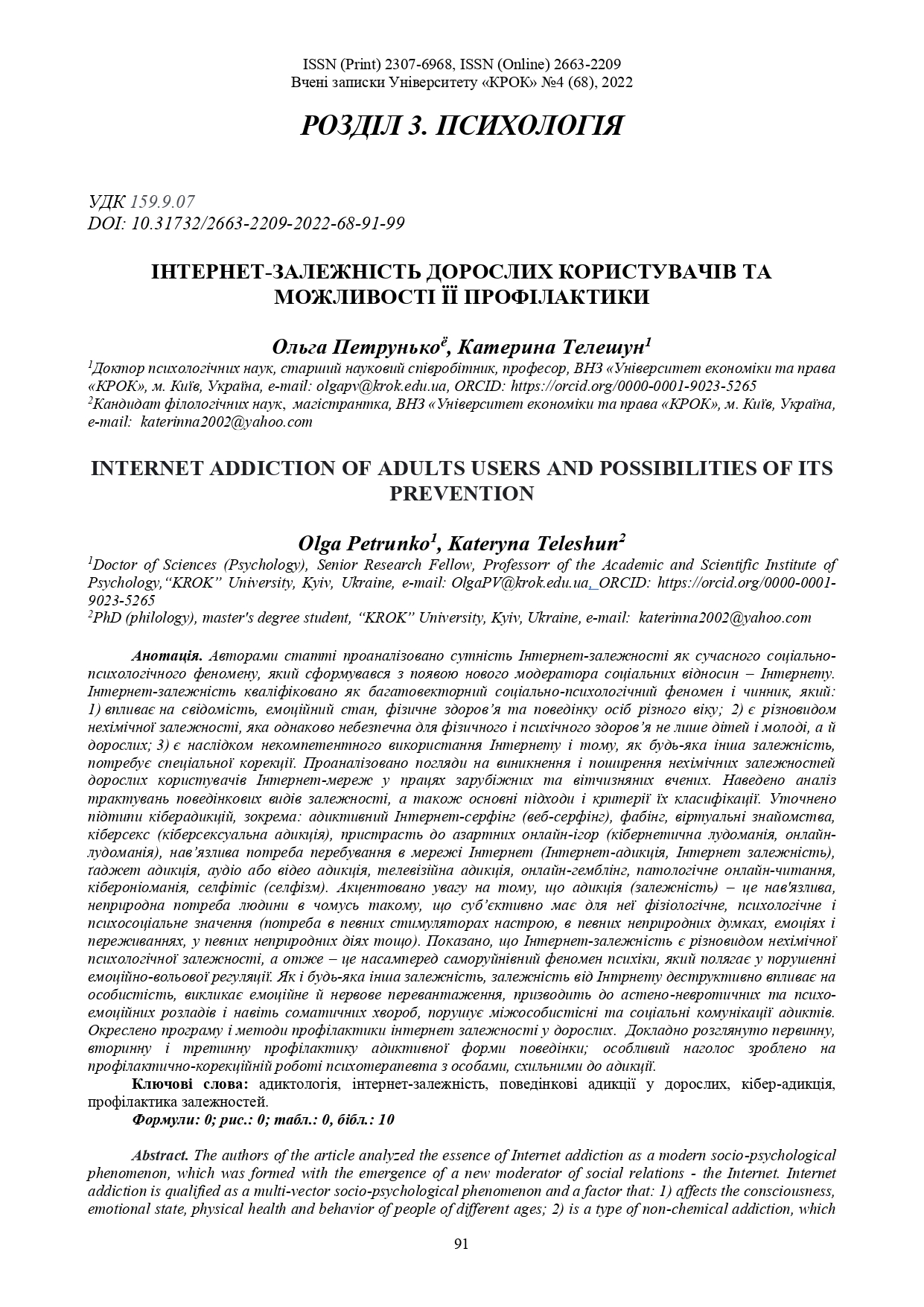INTERNET ADDICTION OF ADULTS USERS AND POSSIBILITIES OF ITS PREVENTION
DOI:
https://doi.org/10.31732/2663-2209-2022-68-91-99Keywords:
addictology, Internet addiction, havioral addictions in adults, cyber addiction, prevention of addictionsAbstract
The authors of the article analyzed the essence of Internet addiction as a modern socio-psychological phenomenon, which was formed with the emergence of a new moderator of social relations - the Internet. Internet addiction is qualified as a multi-vector socio-psychological phenomenon and a factor that: 1) affects the consciousness, emotional state, physical health and behavior of people of different ages; 2) is a type of non-chemical addiction, which is equally dangerous for the physical and mental health of not only children and youth, but also adults; 3) is a consequence of incompetent use of the Internet and therefore, like any other addiction, requires special correction. Views on the emergence and spread of non-chemical addictions among adult Internet users are analyzed in the works of foreign and domestic scientists. An analysis of interpretations of behavioral types of addiction is given, as well as the main approaches and criteria for their classification. The subtypes of cyber addictions are specified, in particular: addictive Internet surfing (web surfing), phabbing, virtual dating, cybersex (cybersexual addiction), addiction to online gambling (cybernetic ludomania, online ludomania), obsessive need to stay on the Internet (Internet addiction, Internet addiction), gadget addiction, audio or video addiction, television addiction, online gambling, pathological online reading, cyberneomania, selfitis (or selfism). Attention is focused on the fact that addiction (dependency) is an obsessive, unnatural need of a person for something that subjectively has physiological, psychological and psychosocial significance for him (the need for certain mood stimulants, certain unnatural thoughts, emotions and experiences, in certain unnatural actions, etc.). It is shown that Internet addiction is a type of non-chemical psychological addiction, and therefore it is primarily a self-destructive phenomenon of the psyche, which consists in a violation of emotional and volitional regulation. Like any other addiction, addiction to the Internet has a destructive effect on the personality, causes emotional and nervous overload, leads to astheno-neurotic and psycho-emotional disorders and even somatic diseases, disrupts the interpersonal and social communications of addicts. The program and methods of prevention of Internet addiction in adults are outlined. Primary, secondary and tertiary prevention of addictive behavior is considered in detail; special emphasis is placed on the preventive and corrective work of the psychotherapist with persons prone to addiction.
Downloads
References
Бартків О.С. Соціально-педагогічна профілактика Інтернет-адикції у студентської молоді // Науковий вісник Східноєвропейського національного університету імені Лесі Українки Сер. “Педагогічні науки”. № 1 (278), 2014. С.166-171.
Мельник В.О. Аналіз сучасного стану психічних та поведінкових розладів пов’язаних з патологічним використанням комп’ютера та інтернет-мережі. Психічне здоров’я. 2011. № 1 (30). С. 22–25.
Менделевич В.Д. Психология девиантного поведения : учеб. пособ. для вузов. Санкт-Петербург: Речь, 2005. 445 с.
Медіакультура особистості / За ред. Л.А Найдьонової та О. Т. Баришпольця. – К.: Міленіум, 2009. 440 c.
Петрунько О.В. Діти і медіа: Соціалізація в агресивному медіасередовищі: Монографія. 2-ге видання. Ніжин: Аспект-Поліграф, 2011. 480 с.
Сергеєва Н.В. Соціально-педагогічні умови профілактики комп'ютерної адикції підлітків. – Автореф. дис. на здобуття наукового ступеня кандидата педагогічних наук за спеціальністю 13.00.05 – соціальна педагогіка / Н.В. Сергеєва. Київ, 2010. 20 с.
Чистяков А.В. Социализация личности в обществе: Интернет-коммуникаций (социокультурный анализ): автореф. дис. ... д-ра социол. наук: спец. 22.00.06 «Социология культуры» / А.В.Чистяков. Ростов-на-Дону, 2006. 58 с.
Юрьева Л.Н., Больбот Т.Ю. Клинические и психологические особенности лиц с компьютерной зависимостью // Український вісник психоневрології. 2002. Т.10. №1 (30). С. 244-245.
Янг К. Диагноз – Интернет-зависимость / К. Янг. СПБ: Мир Интернет, 2008. 240 с.
Griffiths M. D., Kuss D. J., Billieux J. The evolution of Internet addiction: A global perspective. Addictive Behaviors. 2016. № 53. P. 193– 195. doi:10.1016/j.addbeh.2015.11.001

Downloads
Published
How to Cite
Issue
Section
License
Copyright (c) 2022 Ольга Петрунько, Катерина Телешун

This work is licensed under a Creative Commons Attribution 4.0 International License.

